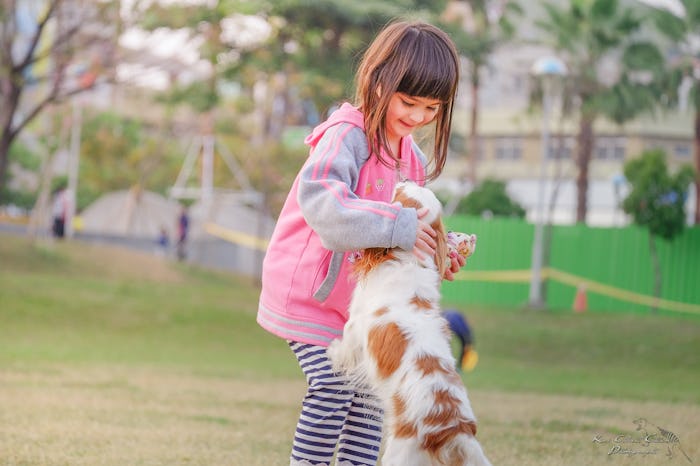Life

How Dogs Are Helping Kids Learn To Love Books
As it turns out, though President Donald Trump's Press Secretary Sean Spicer may be on an apology tour for recent comments he made about the Holocaust, and America's foreign relations seem to be tiptoeing closer and closer to the brink of disaster, there is a bit of good news for everyone, today. Because three of the world's best things have now been scientifically proven to have a positive correlation on each other. Now, reading, dogs, and children are coming together in a beautiful way. Yes, folks, that's right: kids who read to dogs are more likely to love books later in life. And yes, it's as adorable as it sounds.
Recent research has shown that dogs' innate ability to create a relaxed environment, as well as their presence working to make the task at hand (reading) more enjoyable, serves a positive impact on children's relationships with books. Of course, it's widely acknowledged that the importance of children learning to love to read cannot be overstated, but ways in which to achieve that can be complicated and time-consuming, not to mention frustrating for both the kid, and the adult.
So, this new bit of research surrounding the impact dogs can have on a child's relationship to reading is definitely welcome news. But, how exactly do dogs help kids with reading, and how can their impact even be measured?
For the most part, kids like dogs. And by utilizing that positive association between children and animals to foster a positive relationship between children and reading, dogs can help kids who might not already enjoy reading learn to love it. The Reading Education Assistance Dogs (R.E.A.D.) program is a stellar example of this. R.E.A.D. "improves children's reading and communication skills by employing a powerful method: reading to an animal," according to its website.
By not pressuring children, and providing them with a comfortable environment with which they can practice their reading skill, dogs are able to instill confidence in kids who might be struggling with reading. "A dog is a reassuring, uncritical audience who will not mind if mistakes are made," Gill Johnson, Assistant Professor in Education at the University of Nottingham, wrote in a March column for The Conversation, an academic and research website. "Children can read to the dog, uninterrupted; comments will not be made."
But that's not the only way dogs help children love to read. Johnson also stresses that "sharing a good book with a dog enables children to apply their reading skills in a positive and enjoyable way." So, basically, encouraging your kids to read with and to dogs creates a positive, fun experience. And that joy is then related to reading.
And really, if nothing else, having your children read to dogs is just good, clean fun. The world could definitely use more of that.